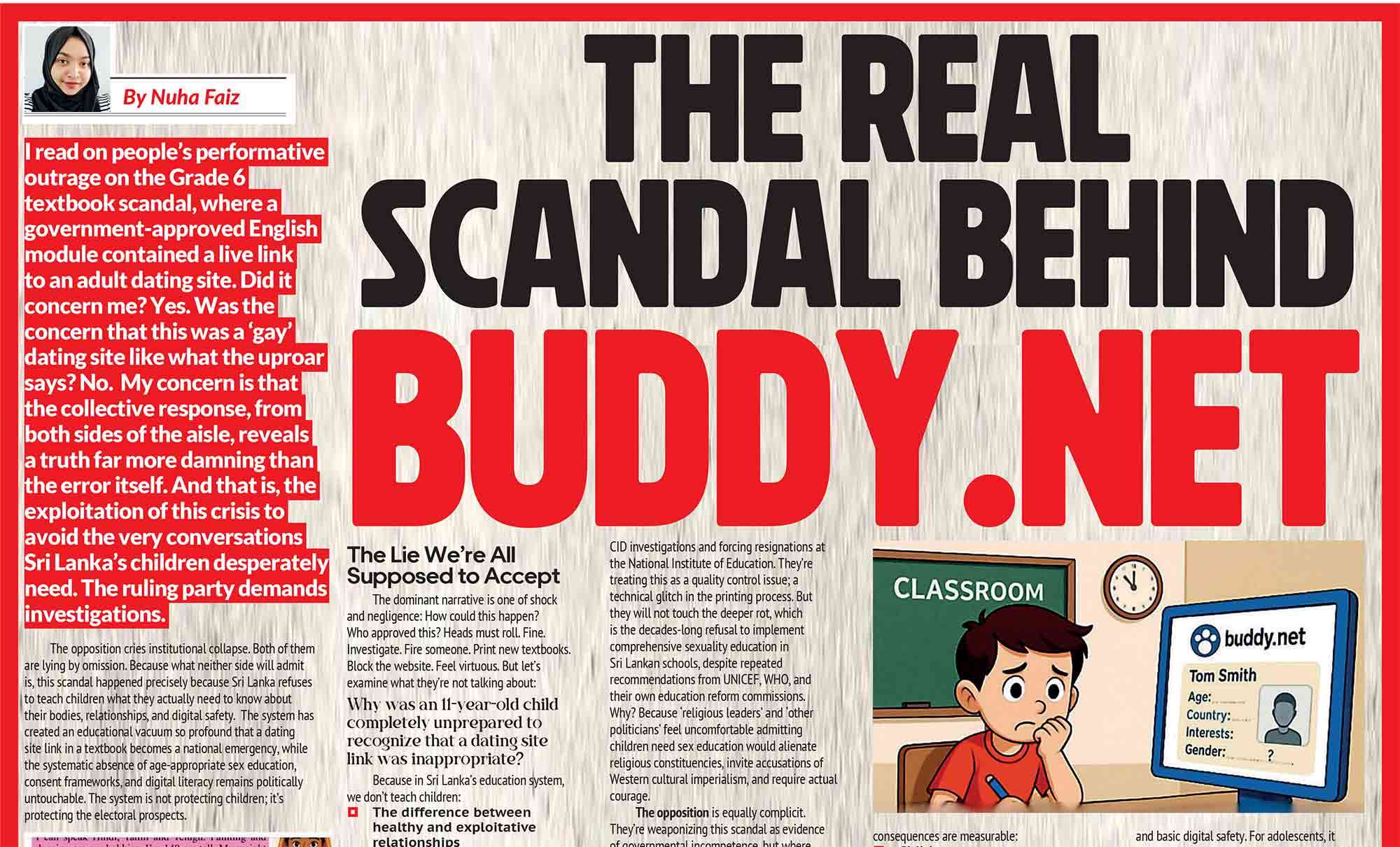
Unpacking the Double Standards in Sri Lanka |
It is a scene as old as cinema itself. Two people fall in love, emotions build, and they kiss. In most parts of the world, this is an unremarkable moment, a storytelling device as ordinary as a monologue or a song. In Hollywood, it is expected. In Bollywood, it has become increasingly normalized. But in Sri Lankan cinema, television, or music videos, a kiss still feels like a ticking time bomb. It does not matter how brief, how tasteful, or how central it is to the narrative. If two Sri Lankan actors kiss on screen, audiences shift uncomfortably, moral guardians cry foul, and regulators reach for their scissors.
Why? Why is a kiss between two Sri Lankans on screen seen as provocative or taboo, while the same gesture in foreign films is accepted without hesitation? Why are we willing to embrace affection in English or Hindi, but not in Sinhala or Tamil? This discomfort is more telling than it appears on the surface. It reflects deep-rooted cultural contradictions, selective morality, and an unwillingness to see our own humanity represented truthfully.
When It Is Foreign, It Is Fine
Walk into a cinema in Colombo or switch on a streaming platform in any Sri Lankan household and you will find no shortage of international content featuring kissing, cuddling, and more. From Marvel blockbusters to romantic comedies, from Korean dramas to Bollywood musicals, global audiences including Sri Lankan viewers watch these scenes without protest. In fact, many actively enjoy them. The kiss is often seen as romantic, aspirational, and cinematic. But when a Sri Lankan actor kisses on screen, it is rarely seen as any of those things. Instead, it is branded inappropriate, Westernised, or even against our culture. There is outrage. There are online tirades. Artists are accused of corrupting tradition. Some are shamed publicly. Others face censorship or industry backlash. This cognitive dissonance, accepting affection when it is foreign but rejecting it when it is local, reveals a troubling lack of self-acceptance. We are okay with love, but only if it does not look like ours.
Culture or Control
Opponents of on-screen kissing often invoke the need to preserve Sri Lankan culture or values. But what exactly are these values, and who decides them? Culture is not a static monolith. It evolves. It reflects the lived experiences, emotions, and stories of people. A culture that claims to value love and family must acknowledge that physical intimacy is a part of that equation. The resistance to kissing scenes is less about preserving culture and more about policing expression. It is about controlling how intimacy is portrayed, especially when it involves women. Public morality in Sri Lanka has long been built on a patriarchal foundation, where women are expected to be modest, passive, and invisible in matters of desire. A woman kissing on screen is not just acting. She is perceived as making a statement, one that threatens traditional hierarchies. The moral panic that ensues is not just about the kiss but about the unsettling possibility that a woman might have the agency to express herself publicly, visibly, and without shame.
The Real and the Fictional Collide
One reason on-screen affection in Sri Lankan media causes discomfort is that it feels too close to home. When a foreign actor kisses on screen, the scene is observed through a cultural buffer. It is fiction from another world, distant from our own reality. But when a Sri Lankan actor performs the same scene, it pierces that buffer. The language is familiar. The faces look like ours. The locations are recognisable. Suddenly, fiction feels like reality and for some, that is deeply unsettling. This is why the outrage is often louder when the kiss appears in a music video or a local short film. The content is not just a product of the global media machine. It is from our own soil. It holds up a mirror. And what we see in that mirror, that our people love, long, touch, and kiss, makes many recoil.
The Burden of Shame
In Sri Lanka, shame is a social weapon. It is used to enforce conformity and suppress deviation from the norm. The target is usually women. When a female actor kisses on screen, the commentary is rarely about the artistic merit of the work. It becomes a referendum on her morality. Her clothing, her background, her upbringing, everything is dissected. Male actors are not immune, but they are rarely subjected to the same vitriol. This gendered reaction exposes a broader discomfort with female autonomy. A woman kissing on screen, even in a scripted context, is seen as transgressive. She is no longer viewed as respectable. And once a woman is deemed unrespectable in the public eye, her work, voice, and personhood are easily dismissed.
Art Needs Truth, Not Sanitisation
Cinema is meant to reflect life. If our stories are stripped of romance, tenderness, or affection, they lose their emotional truth. Not every story needs a kiss, but when one does, its absence can feel dishonest. Characters who are in love but never touch, hug, or kiss feel incomplete and stilted. Audiences deserve to see stories that reflect the full spectrum of human emotion, including intimacy. A kiss can communicate longing, regret, reconciliation, or connection. When done with purpose and sensitivity, it deepens the narrative. Its presence does not dilute culture. It enriches it. Some of the greatest love stories in literature, theatre, and cinema contain moments of physical closeness. They are not obscene. They are human.
Censorship and the Fear of Authenticity
Filmmakers in Sri Lanka often work under intense scrutiny. Regulatory boards, broadcasters, and advertisers all apply pressure to keep content clean. But what does clean really mean? Emotionally sterilised? Devoid of reality? Stripped of romance? This pressure leads to self-censorship. Directors avoid writing certain scenes. Actors hesitate to accept certain roles. Producers cut scenes before they reach audiences. The result is a creative space where real emotion is filtered, flattened, or erased altogether. This is not protection. It is erasure. And the stories we lose in the process are the ones that need to be told the most.
Young Audiences Are Ready. Are We
The irony is that many of the people expressing outrage over kissing scenes are not the ones watching contemporary media most frequently. Young Sri Lankans, the very people said to be influenced or corrupted by such content, are already engaging with global platforms.
They are watching series from South Korea, movies from France, and music videos from Nigeria. They understand nuance. They can differentiate between exploitation and artistic intent. What they want is authenticity. They want to see stories that reflect their lives, emotions, and aspirations. They do not want outdated gatekeeping or moral posturing. They want art that is real.
The Way Forward
Sri Lanka is not alone in this struggle. Every culture that values modesty has had to reckon with changing norms around intimacy in media. Bollywood, once famously shy about on-screen kissing, has gradually embraced it. Even Hollywood had its own censorship era, where kisses were forbidden or limited. These taboos eventually gave way to trust. Trust in the audience, in the creators, and in the stories being told. It is time Sri Lanka moved in that direction. We must stop seeing kissing as a cultural betrayal and start recognising it for what it often is, a moment of connection between characters. Nothing more. Nothing less. Artists must be trusted to tell stories with care. Audiences must be trusted to interpret them with intelligence. And institutions must stop standing in the way of creative honesty.
A Kiss Is Not a Crisis
At its core, this is not about kisses. It is about a society’s willingness to confront its own contradictions. We speak of love but are afraid to show it. We honour storytelling but censor emotion. We consume international intimacy but deny our own. A kiss on screen is not a cultural collapse. It is not a loss of values. It is not a crisis. It is a reflection of life, of love, of art. If we want a vibrant, relevant, and emotionally resonant cinema, we must stop being afraid of our own reflection.










